June 13, 2023 •
Ask The Experts – Texas Sponsorship Laws
Q: My organization wants to sponsor a reception in Texas. State legislators, staff, and family members are likely to be in attendance. As a registered lobbyist, what are my limits and reporting obligations? As a registered lobbyist, there are several […]
Q: My organization wants to sponsor a reception in Texas. State legislators, staff, and family members are likely to be in attendance. As a registered lobbyist, what are my limits and reporting obligations?
As a registered lobbyist, there are several items to keep in mind when sponsoring an event. First, a lobbyist can provide an unlimited amount of food and beverage to an official, employee, immediate family member, or guest when the lobbyist attends the event. If not present at the event, food and beverage expenditures are limited to $100 or less.
Next, when engaging with officials at the event, sponsorship is considered a lobbying expenditure and will need to be disclosed on the appropriate lobbying report. These reports break expenditures down by type (food and beverage, entertainment, transportation, etc.) and by recipient. This may seem straightforward, but if your sponsorship goes to the organizing entity, how do you know how your dollars are being used?
The state provides some guidance here. When reporting expenditures for a reception or banquet type event, the Food and Beverage category includes all items needed to hold the event such as room rental, table settings, and printing costs. Other categories may need to be included depending on the specific event.
Additionally, you will need to know who among the attendees are in a reportable category of persons benefitted. Generally, this is state senators/representatives, state officers, state employees, immediate family members, and guests. If a combination of these groups are in attendance, or a combination of covered and non-covered individuals, the expenditure should be divided appropriately based on the numbers in each category. If all members of the legislature are invited, the entire expenditure is reported under that category. As long as all members are invited, it does not matter how many actually attend.
Finally, keep in mind the detailed reporting threshold. If the per person costs exceed the threshold, currently $132.60, the individuals must be identified and other details disclosed.
For more information, please see the “Reports Required” and “Gift Law” sections of the Lobbying Compliance Laws online publication for Texas. If you have any questions, please feel free to contact us.
June 7, 2023 •
Connecticut Legislature Adjourns Sine Die
The Connecticut Legislature adjourned sine die on June 7 after passing a two-year $51 billion state budget. The budget includes historic cuts to personal income taxes and the reduction is predicted to benefit approximately 1 million of the state’s 1.7 […]
The Connecticut Legislature adjourned sine die on June 7 after passing a two-year $51 billion state budget.
The budget includes historic cuts to personal income taxes and the reduction is predicted to benefit approximately 1 million of the state’s 1.7 million income tax filers.
The new budget also boosts state aid for local school districts by an additional $329 million.
Once the budget is signed by Gov. Lamont, it will take effect July 1.
This does affect lobbying reporting. The final monthly activity report is due July 10.
May 12, 2023 •
Ask the Experts – Paying lobbyists a bonus or success fee

Q: Can we pay our lobbyists a bonus or success fee? A: In most states, no. An overwhelming majority of states have banned payments to lobbyists as a result of, or based on some way upon, the lobbyist’s success in […]
Q: Can we pay our lobbyists a bonus or success fee?
A: In most states, no. An overwhelming majority of states have banned payments to lobbyists as a result of, or based on some way upon, the lobbyist’s success in achieving a specific governmental action. Thus, as a practice, it is best to pay your lobbyists a straight salary or simple monthly retainer. However, Louisiana, Missouri, New Hampshire, and Wyoming, as well as the District of Columbia and Puerto Rico, have not enacted contingency fee bans.
An important aspect of contingency fee bans to consider is their effect on staff selling to state governments. Many states require those selling to the state to register as lobbyists in some circumstances. Should registration as a lobbyist be required, they will then be subject to those same contingency fee bans, which can be problematic given most salespeople are paid commissions on successfully completed sales. Thankfully, many states have recognized this reality and have carved out an exception for bona fide commissioned salespeople, either allowing them to avoid the registration requirement or, if they do register, the ban on receiving commissions. Nevertheless, it is important to be aware of the rules regarding lobbyist registration and contingency fees as applied to salespeople so you can plan accordingly.
More information about contingency fees as applied to lobbyists can be found in the Contingency Lobbying section of the Lobbying Compliance Guidebook on the State and Federal Communications website. Information about registration requirements for procurement lobbying and contingency fee information specific to salespeople can be found in the Procurement Lobbying Compliance Guidebook.
November 17, 2022 •
Meet Adrienne Borgstahl, Esq., Manager, Compliance Services
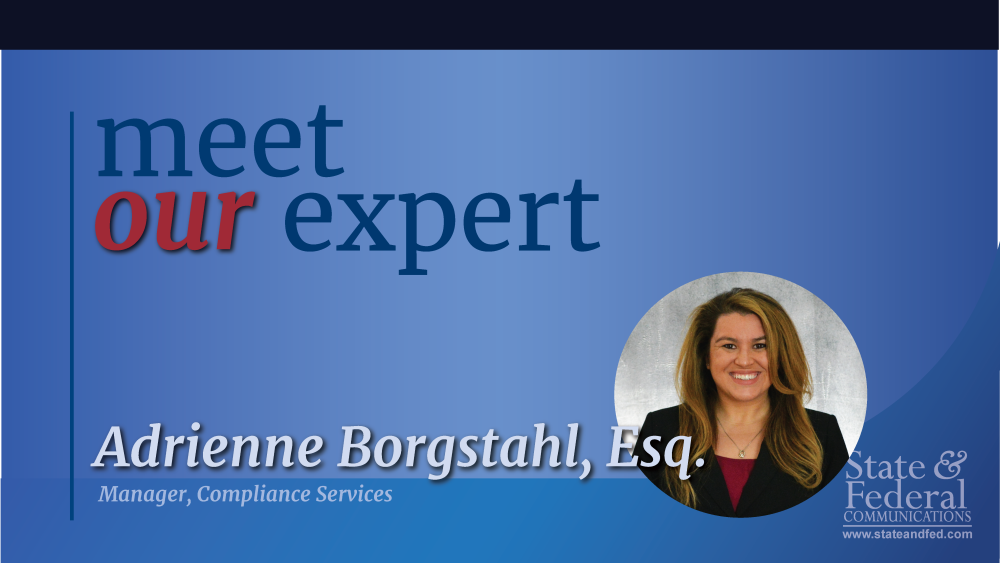
Meet Adrienne Borgstahl, Esq., Manager, Compliance Services at State and Federal Communications! What are your areas of expertise? I am a Manager of Compliance Services in our compliance department. I specialize in providing guidance regarding ethics and lobbying laws. How […]
Meet Adrienne Borgstahl, Esq., Manager, Compliance Services at State and Federal Communications!
What are your areas of expertise?
I am a Manager of Compliance Services in our compliance department. I specialize in providing guidance regarding ethics and lobbying laws.
How many years of experience do you have at State and Federal Communications?
I have been with the company for 6 and a half years.
What is it that you do to help our clients?
I always answer questions promptly and try to present our clients with the big picture. When I provide our clients with all the necessary information, they can rest easy!
October 24, 2022 •
Ask the Experts – Goodwill Lobbying and Keeping Compliant

Q: I am a registered lobbyist in Illinois and want to take an Illinois official out to dinner in order to garner goodwill. What do I need to know to ensure we are compliant? A: In Illinois, lobbyists reports must […]
Q: I am a registered lobbyist in Illinois and want to take an Illinois official out to dinner in order to garner goodwill. What do I need to know to ensure we are compliant?
A: In Illinois, lobbyists reports must itemize for each individual expenditure or transaction, including any expenditures made by a consultant in performing services for the lobbying entity. The report must include the name of the official for whose benefit each expenditure was made, the name of the client the expenditure was made on behalf of, the total amount of the expenditure, a description of the expenditure, the vendor to whom the expenditure was made, the date of the expenditure, and the subject matter of the lobbying activity, if any.
Lobby or lobbying is to communicate, including the soliciting of others to communicate with an official of the executive or legislative branch of state or local government for the ultimate purpose of influencing executive, legislative, or administrative action at the state, municipal, county, or township government level. In Illinois, influencing includes promoting goodwill. Additionally with the passage of Senate Bill 539 in 2021, lobbying on a local level, except in Chicago, requires registration and reporting with the state.
In order to comply with Illinois lobbying law, the dinner would need to be reported on the appropriate entity report. There are two notification requirements a lobbyist must make to an official. First, the official must be informed, in writing, at the time the expenditure is received by the official, that the expenditure is reportable, and the official will appear in the expenditure report. Second, within 30 days after a reporting deadline, a lobbyist must notify each official on whose behalf an expenditure was reported. The 30-day notification must include the name of the registered lobbyist, a description, the total amount, the date, and subject matter of the expenditure. Please note there is a $75 per person limit on meals. Additionally, because Illinois does not have a time or expenditure registration threshold, any other individuals attempting to influence the official will need to register as a lobbyist.
For more information, check out the “Reports Required” section of the Lobbying Compliance Laws online publication for Illinois. Please do not hesitate to contact us if you have questions.
August 11, 2022 •
Ask the Experts – Where do I get started?

Q: I have taken on a new role handling our company’s government outreach in Florida. I will likely be lobbying both state and local officials. Where do I get started? A: Florida offers a labyrinth of compliance issues for state […]
Q: I have taken on a new role handling our company’s government outreach in Florida. I will likely be lobbying both state and local officials. Where do I get started?
A: Florida offers a labyrinth of compliance issues for state and local lobbyists. The decentralized nature of the regulatory landscape means you may need to register at the state level, as well as in each individual city or county where you will be active.
At the state level, registration is required prior to engaging in lobbying activities. This includes any attempt to obtain the goodwill of a legislator, executive official, or employee of either branch. Registrants must select whether they will be lobbying the Legislative Branch, Executive Branch, or both. Activity reports for the state are limited to lobbying firms, who must disclose compensation received on a quarterly basis. Gift disclosures may also be required for any registered lobbyist, but we will discuss these in a moment.
Engaging with city or county officials is where staying compliant can be complicated. Most cities and counties have their own registration and reporting ordinances. Luckily, a general theme throughout is the requirement to register prior to engaging with officials. Most locales require annual registration, for either the calendar year or fiscal year, and reporting of lobbying activities. Be careful here to note the reporting periods as they can differ from the registration period. Some cities, such as Orlando, do not require the submission of a report if no expenses were incurred during the reporting period.
Also, be sure to note additional requirements such as meeting logs, lobbyist trainings, or registrations with subgroups of a municipality. For example, Miami-Dade County Publics Schools has its own registration requirement separate from Miami-Dade County.
Finally, whether you are registered with the state or a municipality, state statutes require quarterly disclosures of gifts to certain officials and employees. These reports include gifts valued at more than $25 given to officials or employees who file financial disclosures with the state; however, no such report is required if no reportable gifts were given. And, as always, please be sure any gift is permissible according to the relevant ethics rules.
For more information, be sure to check out the “Registration” and “Reports Required” sections of the Lobbying Compliance Laws online publication for Florida and its municipalities. If you have any questions, please feel free to learn more and contact us at www.stateandfed.com
July 7, 2022 •
Ask the Experts – Hiring Outside Lobbying Firms

Question: I am hiring an outside lobbying firm soon. What sorts of compliance issues should I be watching for? Answer: You no doubt have a list of criteria you use when evaluating an outside firm’s ability to advocate for your […]
Question: I am hiring an outside lobbying firm soon. What sorts of compliance issues should I be watching for?
Answer: You no doubt have a list of criteria you use when evaluating an outside firm’s ability to advocate for your company, but there are other issues you should be looking for.
Many lobbyists are former government officials and staffers, which means they are likely subject to revolving door provisions. While those restrictions will have expired for the majority of lobbyists if there is a new hire at the firm they may still be subject to time or subject matter restrictions and unable to lobby on your behalf. Revolving door restrictions can be a general ban on any lobbying in that jurisdiction, a ban specific to a particular issue in which the former government employee was heavily involved, or a ban only on lobbying their former government agency. If your firm is recommending a lobbyist who recently left government employment, you will want to confirm the lobbyist has no restrictions that will affect their work.
You will also want to ensure the firm is properly filing required registrations and reports. This information is publicly available on state websites, so it is not difficult to determine if the firm is meeting its obligations. Look for reports that are past due and reports that were filed after the due date. This is especially critical if you are going to be relying on the firm to file your company’s principal reports for you.
Finally, search the state’s website for fines, penalties, and reprimands issued to the firm. Again, your company’s reputation, both with the public and with the government officials contacted, will be tied to the firm.
More information about these topics can be found in the Lobbying Compliance Guidebook on the State and Federal Communications subscriber website. Specifically, information regarding revolving door restrictions can be found in the Important Features of the Law section, report due date information can be found in the Reports Required section, and the Contact Information section has links to state ethics websites.
April 13, 2022 •
Meet our Expert – John Cozine, esq.
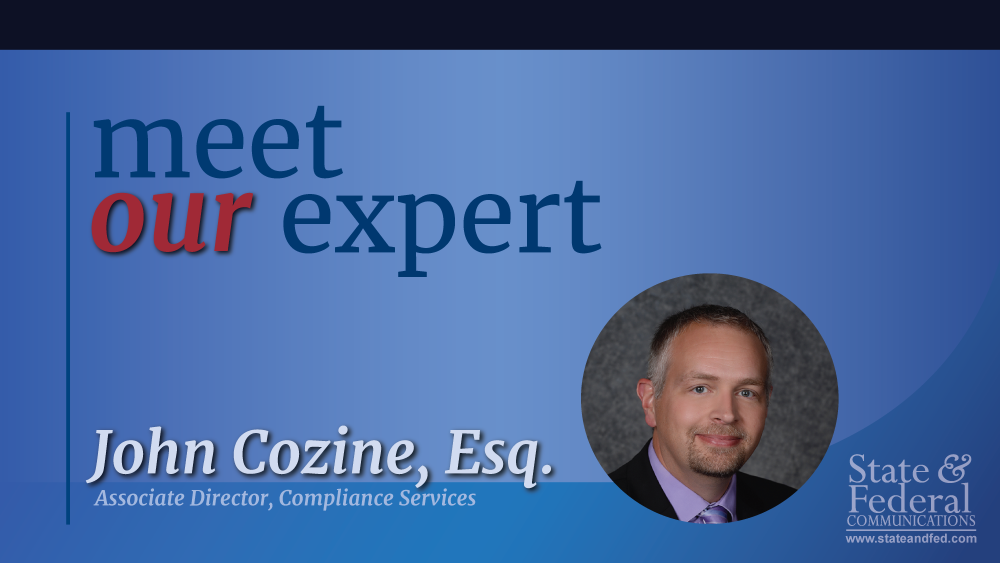
Meet John Cozine, Esq., Associate Director, Compliance Services! What are your areas of expertise? I’ve done it all in my time here, but most of my work focuses on lobbyist registration and reporting, gifting questions, procurement lobbying, and revolving door […]
Meet John Cozine, Esq., Associate Director, Compliance Services!
What are your areas of expertise?
I’ve done it all in my time here, but most of my work focuses on lobbyist registration and reporting, gifting questions, procurement lobbying, and revolving door issues.
How many years of experience do you have at State and Federal Communications?
More than 16 years.
How do you help our clients?
I’m the primary point of contact for many of our clients, so they frequently come to me first with questions. I either answer their questions or connect them with the appropriate Manager who can assist them. As the person in charge of the Compliance Department I ensure all of our clients’ filings are made on time so they can stay out of the newspapers.
March 3, 2021 •
Ask The Experts: Gifts of Aloha

Q: The Hawaii State Ethics Commission just released updates to their administrative rules. As a registered lobbyist in the state, how do these changes affect me? A: First, the Ethics Commission’s changes clarify gift rules for registered lobbyists and their […]
Q: The Hawaii State Ethics Commission just released updates to their administrative rules. As a registered lobbyist in the state, how do these changes affect me?
A: First, the Ethics Commission’s changes clarify gift rules for registered lobbyists and their clients. “Gifts of aloha,” items with a value of less than $25, are no longer permitted. Lobbyists were previously allowed to give legislators and their staff items such as food, reusable water bottles, and other trinkets because of ambiguity in the governing statutes; however, the new rules make it clear that this practice is now prohibited. Furthermore, any gift given to a legislator’s office where a recipient is not specified will be deemed a gift to the legislator.
Other items, however, are still permitted. Lei, excluding money lei, as well as promotional pens, notebooks, hats, etc. are allowed. Travel to bona fide professional conferences, including modest food and beverage, are also still permitted. To determine if a gift is permissible, the Ethics Commission strongly encourages consultation with a member of the staff to avoid potential monetary penalties.
A few additional items of clarification simply spell out longstanding advice from the Commission. All expenditures should be reported on an accrual basis beginning January 1, 2021, and time drafting and providing testimony, as well as time spent waiting to testify, are included in determining if the registration threshold has been met. Finally, individuals engaging in “background work” at the direction of a registered lobbyist do not have to register so long as they do not communicate directly with public officials.
March 21, 2016 •
Proposed Bill Would Allow Colorado Independent Ethics Commission to Investigate Complaints
The Colorado Independent Ethics Commission is coming under harsh criticism in the wake of records released by the state auditor, with some claiming it is unethical. Often, the burden of investigating and presenting a case for an ethics violation falls […]
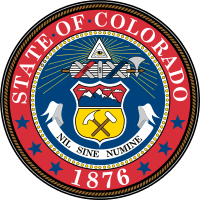 The Colorado Independent Ethics Commission is coming under harsh criticism in the wake of records released by the state auditor, with some claiming it is unethical. Often, the burden of investigating and presenting a case for an ethics violation falls upon the person filing the complaint. As an alternative, state Rep. Beth McCann is sponsoring House Bill 1216 to enhance the ability of the commission to investigate public officials who skirt the ethics rules.
The Colorado Independent Ethics Commission is coming under harsh criticism in the wake of records released by the state auditor, with some claiming it is unethical. Often, the burden of investigating and presenting a case for an ethics violation falls upon the person filing the complaint. As an alternative, state Rep. Beth McCann is sponsoring House Bill 1216 to enhance the ability of the commission to investigate public officials who skirt the ethics rules.
One of the more specific issues addressed in HB 1216 is the role of the attorney general. Currently, the commission relies on the legal assistance of the attorney general; if the person accused of an ethics violation is an elected official, the attorney general must also provide legal assistance to the official. HB 1216 would require the panel to retain or employ independent counsel rather than rely on the attorney general.
March 16, 2016 •
Proposed Lobby Law Changes Up for Public Comment in Portland
The City Auditor has announced a comment period for potential changes to the city’s lobbying code. The significant changes include closing a loophole in registration requirements by establishing a $1,000 registration threshold. Other changes include broadening revolving door restrictions and […]
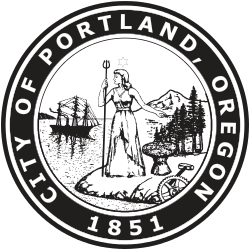 The City Auditor has announced a comment period for potential changes to the city’s lobbying code. The significant changes include closing a loophole in registration requirements by establishing a $1,000 registration threshold. Other changes include broadening revolving door restrictions and increasing penalties for repeated violations.
The City Auditor has announced a comment period for potential changes to the city’s lobbying code. The significant changes include closing a loophole in registration requirements by establishing a $1,000 registration threshold. Other changes include broadening revolving door restrictions and increasing penalties for repeated violations.
The comment period is open from now until March 30, 2016.
March 30, 2015 •
Virginia Governor Proposing Changes to Ethics Reform Bill
Gov. Terry McAuliffe plans to offer amendments to the ethics reform bill passed last month. HB 2070 creates a $100 per gift cap to replace the current $250 aggregate limit lawmakers must abide by. Gov. McAuliffe announced he would like […]
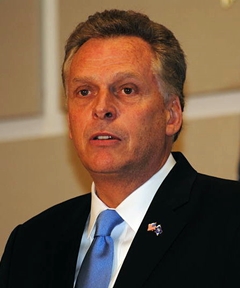 Gov. Terry McAuliffe plans to offer amendments to the ethics reform bill passed last month. HB 2070 creates a $100 per gift cap to replace the current $250 aggregate limit lawmakers must abide by.
Gov. Terry McAuliffe plans to offer amendments to the ethics reform bill passed last month. HB 2070 creates a $100 per gift cap to replace the current $250 aggregate limit lawmakers must abide by.
Gov. McAuliffe announced he would like to see a $100 aggregate limit to prevent legislators from accepting repeated gifts from lobbyists.
A legislative session is scheduled for April 15 for lawmakers to consider McAuliffe’s amendments and vetoes.
Photo of Gov. Terry McAuliffe by Edward Kimmel on Wikimedia Commons.
October 29, 2013 •
I-522 Breaks Fundraising Record
More than $21M raised by opponents of the initiative
 Opponents of Initiative 522, a ballot measure requiring food producers to label food items containing genetically engineered ingredients, have broken a Washington fundraising record.
Opponents of Initiative 522, a ballot measure requiring food producers to label food items containing genetically engineered ingredients, have broken a Washington fundraising record.
The No on 522 campaign has raised more than $21 million, the most money ever raised by a statewide initiative campaign.
The overall fundraising for Initiative 522, on both sides of the issue, totals $27.7 million, which is the second highest total in state history.
October 29, 2013 •
Safe Chemicals Stroller Brigade
Demonstration to urge lawmakers to update toxic substance law
 Eight moms from Portland, Maine, joined hundreds of other moms from across the country to demonstrate on the lawn of the U.S. Capitol in a campaign called the Safe Chemicals Stroller Brigade. The purpose of the demonstration was to raise awareness about unsafe chemicals used in household products and to urge lawmakers to consider updates to the 1976 federal Toxic Substances Control Act, which has not been updated since its passage.
Eight moms from Portland, Maine, joined hundreds of other moms from across the country to demonstrate on the lawn of the U.S. Capitol in a campaign called the Safe Chemicals Stroller Brigade. The purpose of the demonstration was to raise awareness about unsafe chemicals used in household products and to urge lawmakers to consider updates to the 1976 federal Toxic Substances Control Act, which has not been updated since its passage.
The Maine moms also met with members of the state’s congressional delegation to lobby Congress for the passage of legislation proposed by Maine Sen. Susan Collins. The Chemical Safety Improvement Act would require federal regulators to test chemicals for their health effects across a variety of consumers, including children and pregnant women.
Photo of the United States Capitol by Zack Rudisin in Wikimedia Commons.
State and Federal Communications, Inc. provides research and consulting services for government relations professionals on lobbying laws, procurement lobbying laws, political contribution laws in the United States and Canada. Learn more by visiting stateandfed.com.

